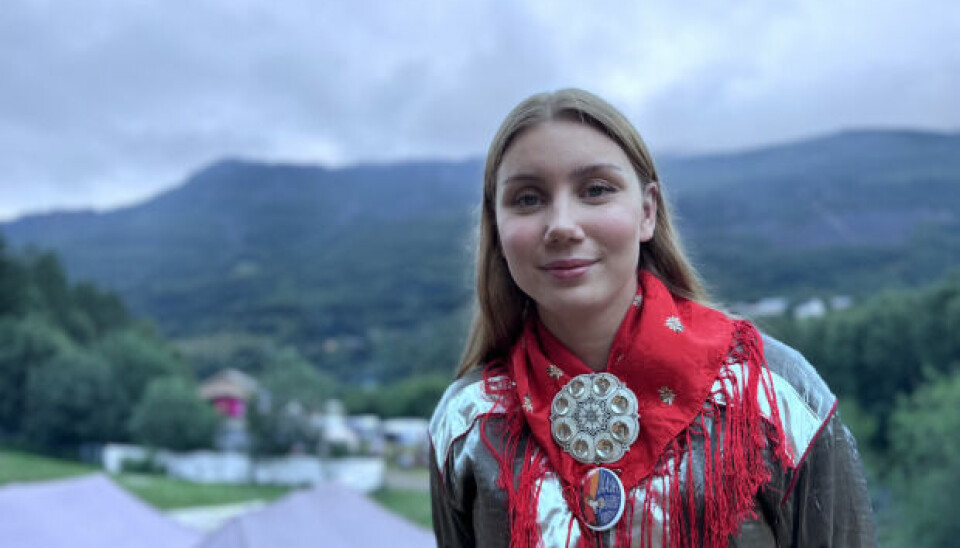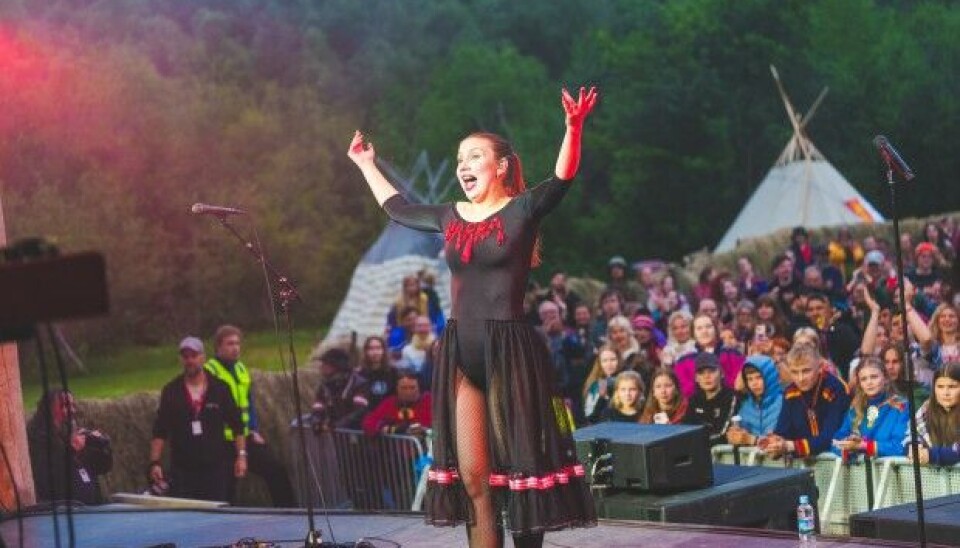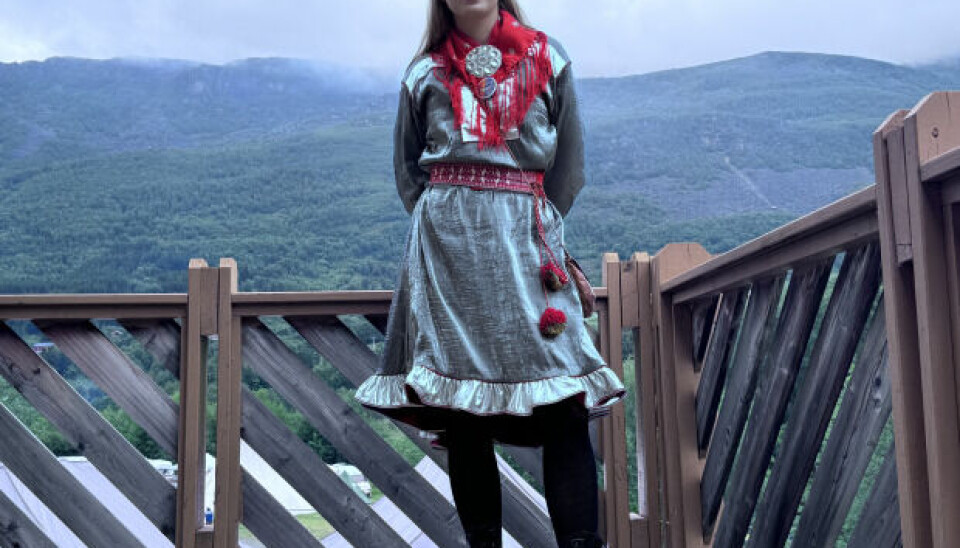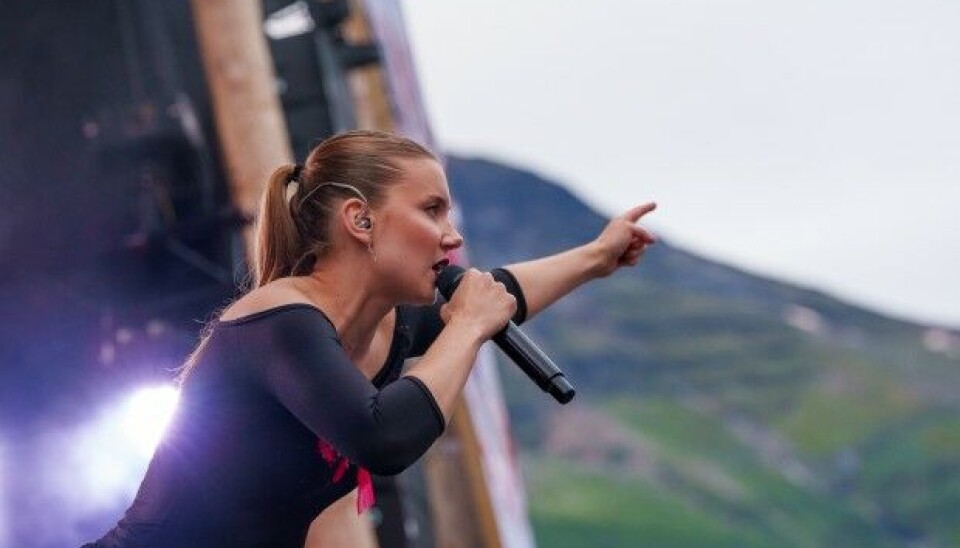Ella Marie: Oppressed people should resist - I think it's good for the soul
Sámi artist and activist Ella Marie Hætta Isaksen was one of the artists performing at the Riddu Riđđu festival in Manndalen in northern Norway, which took place July 10-13. The Barents Observer met with her during the festival to talk about what fuels her activism and the key issues she sees facing the Sámi People right now.
The 26 year old Sámi activist, actor and singer from Tana municipality in northernmost Norway explains that activism has come naturally to her due to her personality.
It all started when Ella Marie Hætta Isaksen, as a young environmentalist, became deeply worried about climate change.
“When I got a bit older, I could really see the connection between environmentalism and my own culture. As we know Indigenous Peoples all around the world protect biodiversity, and Indigenous Peoples’ rights protect biodiversity”, she says.
This made Ella Marie see the link between preserving her culture and preserving the environment.
I feel like I’m so often so mad on behalf of so many generations who were silenced. And I feel like I have been given the opportunity of a microphone and a platform, and I will use that platform to speak up. - Ella Marie
Land claims
When asked about the biggest threat to the Sámi People today, Ella Marie unhesitatingly responds that it is the ongoing claim to Sámi land.
The many industrial projects going on in the North, cabin and road building, fish farms, mining and wind power plants all jeopardise the Sámi livelihoods such as reindeer herding and traditional fishing, and consequently the Sámi People, she explains.

“Like all Indigenous people, we are so connected to the forest, the mountains and the rivers. So, if you harm them, you harm us.”
How does it make you feel?
“I struggle a lot with anger and rage, but I try to use those feelings to canalise the energy towards something constructive. And I feel that activism really is a kind of a good relief of all that emotion.”
Good for the soul
Ella Marie says that oppressed people should resist. And not purely because it’s the right thing to do, but because it’s good for the soul.
“I think I kind of protect my soul in some way, and I protect my integrity by doing activism.”
Even though she finds it healing, it’s also exhausting, the singer explains.
Activism onstage
The singer makes sure to utilise her music and her performances for activism.
Her music delivers a message about the struggles of Sámi People and the mourning of the loss of culture, while also celebrating Sámi resilience and unity.
An example of her rebellious nature is exemplified in her comical disstrack in which she mocks the Norwegian Minister of Petroleum and Energy, Terje Aasland.

As she performed the song on Thursday evening at Riddu Riđđu, in a small act of resistance she raised her middle finger towards the audience, sharing her disdain towards the minister who was not present at the festival.
When asked about it she smiles and states that she thinks Aasland knows how she feels about him, and that she doubts he minds her doing so.
“He has one of the most powerful positions in Norway, and he is responsible for violating the human rights of the Sámi. I as an artist and activist, with no formal power at all, feel that I need to use my voice in every way possible to gain attention to the causes that I’m fighting for. Music and humour, and putting things on the edge is a way of doing that”, she says.
She adds that she feels many people fear their own fury instead of acknowledging it. The singer herself is not afraid to use fury as her fule.
“I feel like I’m so often so mad on behalf of so many generations who were silenced. And I feel like I have been given the opportunity of a microphone and a platform, and I will use that platform to speak up.”
Continue to fight
Sámi People are fighting for the rights to practice their culture all over Sápmi.
In Russia there is an ongoing russification process of Indigenous People. In Finland the Sámi fight for their right to self-determination and are still waiting for a reform of the Sámi Parliament Act. In Norway the Sámi parliament has taken the state to court over electrifying Melkøya. And in Sweden the Supreme Administrative Court recently gave a green light to controversial mining plans in Kallak.
Sápmi is the land of the Sámi People, covering the northern parts of Norway, Sweden and Finland, as well as the Kola Peninsula of Russia.
If Ella Marie were to send a message to the Sámi, she would remind them that their existence as a people today is solely due to their ancestors’ resistance.
“We have resisted so many hardships and oppressors in different forms and different states, during different times. I just think it’s a necessity that we honor our ancestors by continuing that fight, by continuing standing up for who we are, for our language and for our claims to the land.”

Despite the burden of oppression, the singer stresses that the community possesses a lot of internal power and that it is a gift to be part of it.
“It’s a gift to be born into a culture that is so kind and respectful of nature and our surroundings. I think focusing sometimes on the gifts instead of the hardships is a good way to keep yourself going.”
Ella Marie also underscores the importance of support.
“Always remember that you’re never on your own, you always have your relatives to lean on and your ancestors to talk to.”
Recognise the history
The singer wants to encourage Swedes, Norwegians and Finns to acknowledge the assimilation process of the Sámi People that the Nordic states were responsible for.
With a determined voice, she explains that neglecting the part of history where your state has harmed other people robs you not only of the truth but also of your own history.
“I think it’s beautiful to dare to acknowledge the past, apologise for the past, and step forward and vow to do better than those before you. I think that’s a really powerful thing that I would encourage everyone to do.”

She believes that people should not be allowed to enjoy Sámi culture without also acknowledging the struggles that the Sámi face.
“You shouldn’t be allowed to enjoy the culture, the food or souvenirs in a tourist attraction kind of way, if you do not acknowledge our claims to these lands and the ongoing fight for our rights.”
Not a decor
Through her artistry, Ella Marie has brought Sámi culture to a wider audience. She sings in Northern Sámi and performs joiks, the traditional form of Sámi song, often while wearing traditional clothing.
Although Ella Marie is grateful that her music has sparked a wider interest, she feels saddened by the widespread ignorance of the Sámi Peoples’ struggles.
“There’s a sadness in realising how willing people are to hear more joik because it’s exotic and we look so gorgeous in our national clothing. But they are not willing to listen to me when I talk about our very traumatising history.”
When people show this ignorance, it makes it uncomfortable to perform in those spaces, she says.
“I feel like I’m only welcome as a décor, or some kind of tourist attraction or a piece to look at, instead of [being welcome as] a real human with a real history.”
How do you deal with the ignorance?
“I get mad and then I act on the fury, and I go chain myself to something and shut down some buildings and do activism.”














